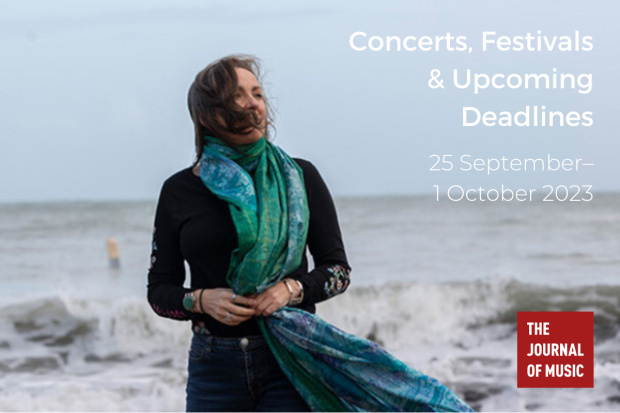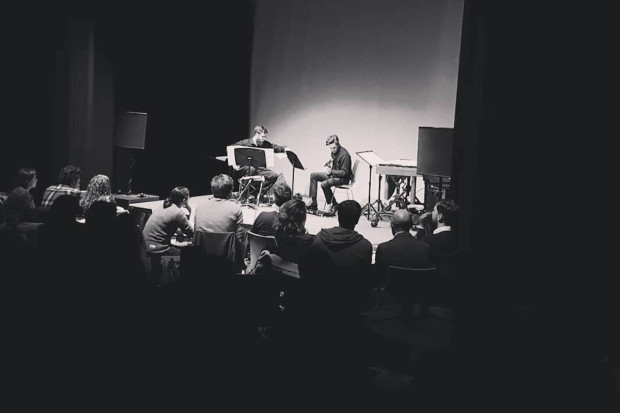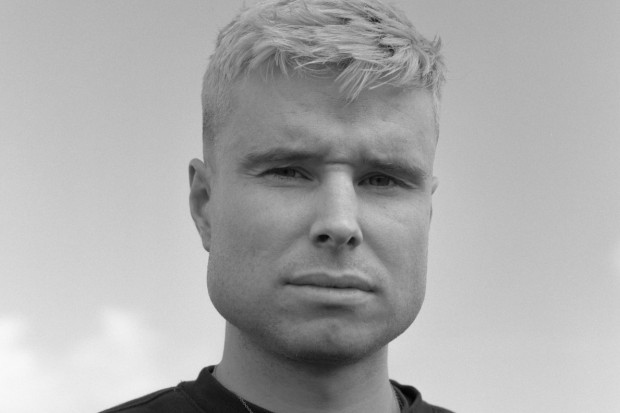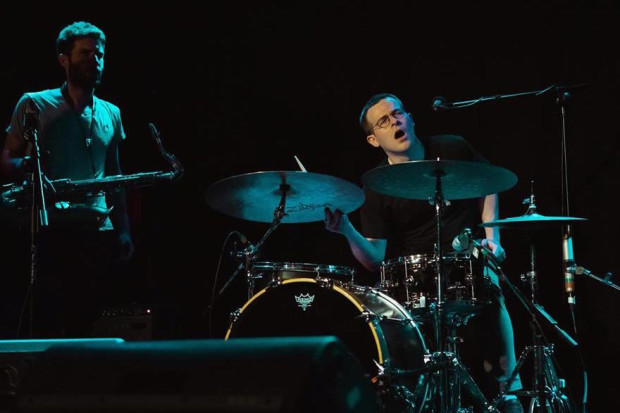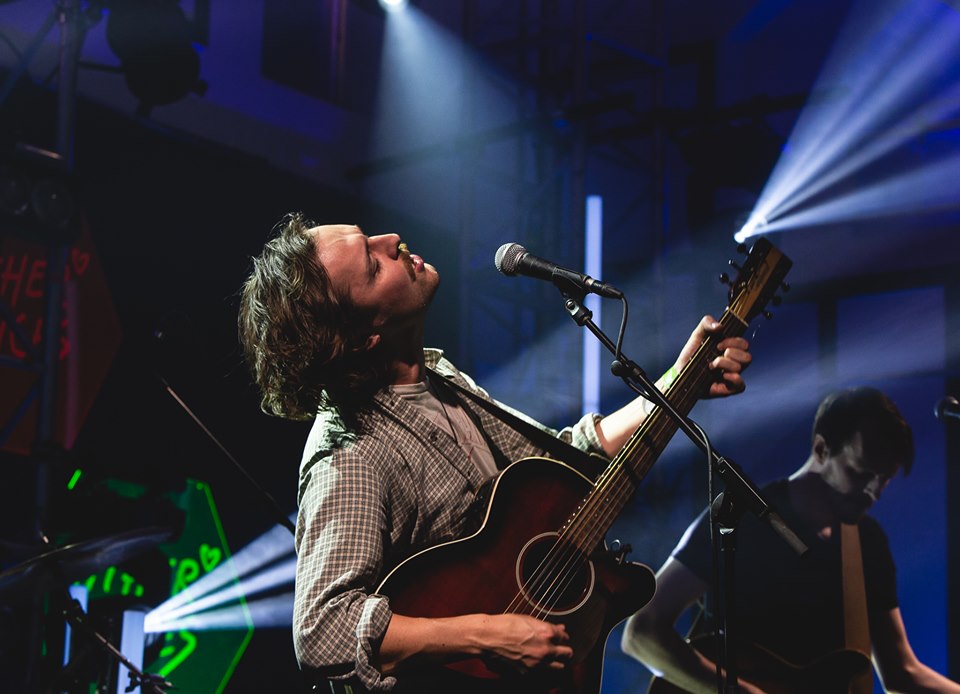
Joshua Burnside performing at Other Voices Belfast (Photo: Tara Thomas)
Generation Borderless
There was an irony in the fact that Other Voices was in Belfast this week. If you tune into debates in Britain at the moment, voices from Northern Ireland really are the ‘other voices’. Their experiences are hardly considered in the discussions about the border, Brexit or the Tory leadership. But the North has a lot to say.
Last Saturday night (15 June), Other Voices recorded one of its eclectic concerts in the Duncairn arts centre and it featured a rare mix of Northern artists – Snow Patrol, Roe, Joshua Burnside, Ryan Vail and Elma Orkestra – plus The Academic. Other Voices is more than a television programme these days however. It began as a recorded-for-TV concert in a church in Dingle seventeen years ago, then it became a festival across the town. For a few days every December, the west Kerry town is crammed with music fans in pubs either enjoying indie acts curated by the festival or watching a live stream from the church. The phenomenon creates a connection between everyone. Energy emanates from St James’ on main street, but it is part of a network of expression. You are within one big musical experience no matter where you are.
If it sounds like Other Voices could be difficult to reproduce elsewhere, it has not stopped it spreading. This July it is in Berlin (for the second time); in 2011 it was in New York; then Derry in 2013; Austin, Texas in 2016; last September it moved to Ballina, Co. Mayo; and it regularly had a stage at Electric Picnic.
Of course, the truth is that if Other Voices had started in Dublin, it would never have left the capital. It has the liberating ‘view from the periphery’. Founder and producer Philip King sees the potential for music everywhere, and he is also adept at creating a space for free conversation. In Belfast, Other Voices hosted not just the main concert but events around it too, including two discussions titled ‘The Given Note’ on Saturday afternoon. ‘I believe in the redemptive power of music,’ King said, opening the proceedings. Divisions seem to ‘slip away’ with music, he added. Could it be true?
Arts led
Lynette Fay, who was chairing the first discussion, asked the Director of the Duncairn Ray Giffen to put the conversation in context. The Duncairn is in North Belfast in a predominately nationalist area, off the Antrim road, an area that has had enough Troubles. But creativity now brings people together. When the Duncairn opened in 2014, 12% of its audiences were from the Protestant, unionist and loyalist communities. In five years that has risen to 32%. ‘It’s all arts led,’ says Giffen. ‘The arts are the most powerful tool we have in creating a community.’
Charlotte Dryden of the Oh Yeah music centre, which supports upcoming artists, was also contributing to the discussion: ‘With political uncertainty, with inequality, artists are responding to that in really interesting ways… something really exciting is happening here.’ She cites the Wood Burning Savages and their album Stability. Fay suggests that young musicians are in fact being ‘empowered’ by the political climate, as opposed to being intimidated by it; they are not as concerned anymore about saying what they think. This was not the BBC news.
In a second discussion, the contributors were Lyndon Stephens of Quiet Arch records, film-maker Sinead O’Shea, and musicians Eoin O’Callaghan and Joshua Burnside. What immediately leaped out from this discussion was just how disconnected the politics around Northern Ireland (and in London) are from the generations coming up. Eoin O’Callaghan’s latest project is a collaboration (as Elma Orkestra) with Ryan Vail called Borders. It’s not so much a political statement about borders as an expression of incredulity at the whole concept, whether in Ireland or around the world. This is a generation that sees division between people as nonsensical, even trivial, and who could say anything but they are correct? Isn’t that the hard lesson that Ireland slowly learned?
The Borders album, O’Callaghan says, is ‘not just about the line… what was drawn on a map… about the fighting that always goes on … all over the world’. The message of the album is to ‘take a look at the world through a wider lens… step back and you are not going to see that line anymore… step back further and it’s fields and sea… these lines were drawn by men… they just decided where the line is… … [the line] is invisible. You go down to the border and you see trees. It’s not like they turn a different colour over here.’
This is Generation Borderless and it was refreshing. If you put the earphones on and walk down the Antrim Road, as I did, Borders really does sound like the soundtrack to better times.
My street too
Joshua Burnside was also part of the discussion and at the end he sang his song ‘Red and White Blues’. For one man and a guitar, Burnside’s songs have a lot of bandwidth; they are unpredictable in the way they pair words with music which makes you return to them. His collections of songs, Ephrata (2017) or his new album Live at the Elmwood Hall, are beyond any political statement, but he can nail it if he needs to: ‘Red and White Blues’ is an expression of the impatience of a new generation – ‘I was brought up a Prod / my Ma was in the riot squad / Grandad in the DUP / This never meant much to me / For I was too young to care what flag was flown above me … Don’t paint my pavement red, white and blue / I’ll paint it grey / Y’know it’s my street too …’.
The Other Voices concert that night began with an acoustic set by Snow Patrol. The Northern presenter Phil Taggart (of BBC Radio 1) drew a parallel between two and a half decades of transformation in the North and the music of the band. Experiencing them in Belfast in an intimate setting showed just how powerful the roaming concept of Other Voices can be. Amidst ‘Run’ and ‘Chasing Cars’, Gary Lightbody sang a new song, ‘Thinking of Home’, which received an emotional reception. ‘One thing we can all agree on,’ he sang, ‘there’s beauty north, south, east and west.’ Vail and O’Callaghan were joined by Moya Brennan from Clannad and poet Stephen James Smith to let us hear parts of Borders, switching between post-minimalist piano and driving beats, floating vocals and hard truths. Roe from Derry played guitar, drums and keyboards, and sang, all at the time time with amazing complexity at times. Joshua Burnside with full band moved his songs between folk and noise artistry. The Academic closed the concert by jacking up the whole night further.
Who is listening to these Northern artists, their words, and these audiences? Not Westminster. Not Stormont. I wonder where Other Voices should head to next.
Other Voices from Belfast featuring Snow Patrol, Roe, Joshua Burnside, Ryan Vail and Elma Orkestra, and The Academic, will be broadcast on RTÉ later this year. For more, visit www.othervoices.ie.
Published on 20 June 2019
Toner Quinn is Editor of the Journal of Music. His new book, What Ireland Can Teach the World About Music, is available here. Toner will be giving a lecture exploring some of the ideas in the book on Saturday 11 May 2024 at 3pm at Farmleigh House in Dublin. For booking, visit https://bit.ly/3x2yCL8.














